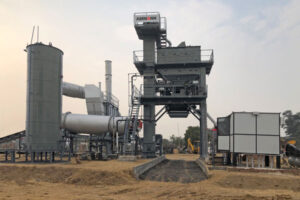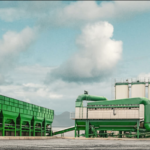
Asphalt plants are impressive machines that produce the asphalt mixture used for constructing roads, parking lots, and other essential infrastructure. They are known for their ability to efficiently combine aggregates like sand, gravel, and asphalt cement to create the smooth and durable surfaces we rely on daily. While there are various components in an asphalt plant, one often overlooked but critical element is the filter system.
The Unseen Heroes: Filters in Asphalt Plants
Filters in an asphalt plant serve as guardians of both efficiency and environmental responsibility. They are essential components that ensure the entire operation runs smoothly and in compliance with environmental regulations.
Imagine an asphalt plant as a giant kitchen where various ingredients are mixed to create a perfect recipe. However, this “kitchen” generates dust, particulate matter, and potentially harmful emissions during the cooking process. Without the right filters in place, this dust and those emissions can wreak havoc on both the environment and the plant’s internal systems.
Here’s why filters are the heart of asphalt plants:
- Efficient Dust Removal: During asphalt production, fine dust particles are generated. Filters capture these particles, preventing them from entering and clogging vital machinery. This ensures the machinery operates smoothly, minimizing downtime and maintenance costs.
- Environmental Compliance: Environmental regulations regarding air quality are stringent, and asphalt plants must adhere to them. Filters play a pivotal role in trapping harmful emissions and particulate matter, reducing the plant’s environmental impact.
- Improved Product Quality: Clean air in the production area enhances product quality. When dust and pollutants are filtered out, the asphalt mix remains pure and consistent, leading to high-quality road surfaces.
- Worker Safety: Filters not only protect the plant but also safeguard the health and safety of workers. Cleaner air reduces exposure to potentially harmful substances, creating a healthier working environment.
Types of Filters in Asphalt Plants
There isn’t a one-size-fits-all solution when it comes to filters in asphalt plants. Different types of filters serve specific purposes, and choosing the right ones is crucial for plant efficiency and compliance. Common filter types include:
- Baghouse Filters: These fabric filters are highly effective at capturing fine particles and are commonly used in asphalt plants.
- Cartridge Filters: These cylindrical filters offer excellent dust removal efficiency and are suitable for various industrial applications.
- Wet Scrubbers: In addition to dust removal, wet scrubbers can help control emissions by using water to capture and neutralize pollutants.
Regular Maintenance for Longevity
Just like any other critical component in an industrial process, filters require proper maintenance to ensure their longevity and effectiveness. Neglecting filter maintenance can lead to decreased efficiency, increased downtime, and costly repairs or replacements.
Routine maintenance tasks for asphalt plant filters include:
- Cleaning or Replacement: Depending on the type of filter, they need periodic cleaning or replacement to prevent clogging.
- Inspections: Regular inspections help identify issues early, allowing for timely repairs.
- Upkeep of Support Systems: Ensure that the support systems, such as fans and ductwork, are in good working order to optimize filter performance.
In Conclusion
Filters in asphalt plants are the unsung heroes that ensure the heart of the operation beats efficiently and responsibly. They play a pivotal role in maintaining plant efficiency, adhering to environmental regulations, and producing high-quality asphalt mixes. Understanding their importance and investing in their maintenance is essential for a successful and sustainable asphalt production process. So, the next time you drive on a smooth, well-maintained road, remember the crucial role filters play in making it possible.
By incorporating filters into your asphalt plant, you not only improve your operation’s efficiency but also contribute to a cleaner and safer environment for everyone. Whether you’re building a new plant or upgrading an existing one, choosing the right filters and implementing a solid maintenance plan is an investment that pays off in the long run.
